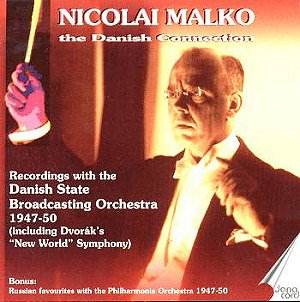After vicissitudes in the Soviet Union in the later
1920s – when exit visa bans became increasingly commonplace – Nicolai
Malko, who at the beginning of the decade had premiered Miaskovsky’s
Fifth Symphony and in 1926 Shostakovich’s First, managed to leave for
good. He was scouted by Danish Radio and as his calling card to the
Radio Symphony Orchestra in Axelborg he dusted down the Miaskovsky and
Rimsky-Korsakov’s evergreen Capriccio Espagnol. Shortly after, the orchestra
duly enlarged, Malko was to take charge and he conducted it for just
under a decade, until forced out by the War. Both he and Fritz Busch,
who also conducted the Radio Orchestra, returned in the 1946-47 season.
There are some splendid things here but none better
than the Dvořák. Of course the world
hardly clamours for another New World, which from the early discographic
days of Landon Ronald and Hamilton Harty has not lacked for proponents.
But there’s something about this performance that grips from the off.
Fresh, verdant and quite quick the first movement is lively and
affectionate (though there is somewhat hobbled rhythm at 4.21 – which
sounds like a side break that has almost imperceptibly loosened the
rhythm). But it’s the slow movement that is really impressive. It conveys
tension even at a slow basic tempo – expansive, long-breathed with emotive
wind solos, well-nuanced counter-themes, and no sense of orchestral
saturation or sentimentality. On the contrary there is real delicacy
of articulation and architecturally a most impressively maintained movement.
The Scherzo is brisk and active but still has enough time for the winds
to breathe freely and the finale is strong and virile, imaginative and
flexible – with Malko ensuring that the winds are clearly heard even
with the powerfully incursive string lines. As I said this is a strongly
individual and impressive reading.
Elsewhere the winds are again characterful in Egmont
– and the lower strings are the very opposite of the Germanic bottom
up tradition. There is clarity instead and quite a mellow sensibility
generally. Note values are inclined to be brisk, Malko allowing melodic
contouring and rise and fall of material (with crescendos and decrescendos)
that aerate the score rather than submerge it. If this is how you prefer
your Egmont – Mendelssohnian rather than Wagnerian – then you will like
Malko’s performance, even if the fiddles sound a little understaffed.
When it comes to Tchaikovsky’s Capriccio Italien we find Malko on bracing
but not unsubtle form – plenty of ebullience and string finesse as well.
He recorded two pieces by Svendsen – the ceremonial bustle of the Festival
polonaise gives us the public face of the composer of the celebrated
Romance whilst Carnival in Paris is characterful and a vigorous little
piece very well conducted, with a puckish Parisian bassoon telling its
own story, full of Gallic flair and repose, romance and lilting delicacy.
Hardly proto-Straussian or Cockaigne, much less Delius’s (overwritten)
Paris but worth an occasional diversion. Nielsen’s Overture to Maskarade
is full of Malko’s (does one say Malkovician?) bustle and brio, bringing
out the vigorous humour with perfectly scaled intelligence. His Waltz
from Tchaikovsky’s Serenade is not quite elfin enough for me – the bass
line is too strong – but the Stravinsky Suite (all six minutes of it)
is well characterized – etched and pointed - and the Polka sounding
like the whole of Walton’s Façade in 54 seconds. The Rimsky-Korsakov
Capriccio espagnol is nicely done if without Barbirolli’s luminous affection
and the Philharmonia tracks that conclude the set – little showpieces
to lighten and brighten post-War austerity are convincing; listen to
the wind playing and lilting strings in the Dance of the Rose Maidens
from the Khachaturian or the spitting venom of the performance of Liadov’s
Baba-Yaga.
The notes are full and helpful, all release issue numbers
and dates are present and correct (and matrix numbers as well) and this
is a fine collection of Malko’s late forties, early fifties self. The
peach is the slow movement of the Dvorak but everything is characterful
and full of his energy and commitment.
Jonathan Woolf


